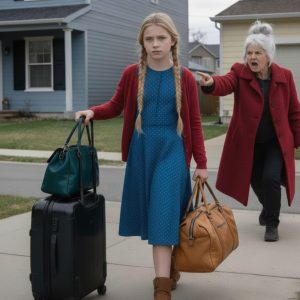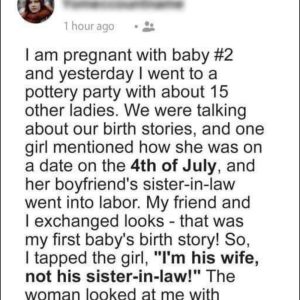The story opens with a quiet acceptance: there were no expectations of receiving anything from her estate, no anticipation, no room for disappointment. That calm is interrupted the very next day when her son calls in a state of anger and confusion. His voice is raised, his emotions raw, and it becomes clear that something in his mother’s belongings has unsettled him. While sorting through an old box she left behind, he found a letter—one that wasn’t meant for him but addressed to the narrator. The discovery alone is enough to sting, suggesting a private connection between his mother and someone outside the family. The phone call is heavy with accusation and pain before the narrator even knows the details, signaling that grief, guilt, and unresolved family history are all converging in this moment. The letter becomes the catalyst for a flood of emotions that neither of them expected in the aftermath of her passing.
The letter itself contains words of gratitude and tenderness. She thanks the narrator for patience and gentleness during her most vulnerable days, acknowledging that they were a steady presence when she needed comfort and peace. She reveals that she couldn’t change her will without causing more conflict, implying that family dynamics were fragile and complicated. Instead of altering legal documents, she chose to express what she couldn’t say publicly through this private letter. Her message is simple yet profound: what the narrator gave her emotionally meant more than anything she could have left behind in material form. It becomes clear that the relationship between them wasn’t transactional or rooted in inheritance—it was built on compassion, presence, and quiet support. The letter wasn’t a gift meant to replace something else; it was a confession of gratitude from someone nearing the end of her life, finally saying what mattered most.
But the son’s anger isn’t actually about the letter. As he continued going through the box, he found receipts, notes, and photographs—evidence that his mother had once planned to create a small trust for him. These items suggested intentions she never fulfilled, dreams she never put into action. To him, the discovery feels like betrayal, a reminder of what could have been. The realization that she spent her final months focused on reconciliation rather than finances hits him unexpectedly. He sees her regrets in writing and learns too late that she had been trying to mend their relationship, an effort he hadn’t recognized while she was alive. That knowledge turns the letter into a mirror, reflecting missed opportunities and emotional distance. His fury stems not from envy of what the narrator received, but from the grief of realizing what he lost without knowing it—time, closeness, and the chance to repair what was broken.
The narrator responds not with defensiveness but with patience, allowing him to pour out everything he’s feeling: anger, shock, sadness, guilt. When the moment is right, they explain gently that the letter was never meant to wound him. It wasn’t a message of exclusion or preference, but simply a quiet expression of thanks written in the only way she felt was safe. There was no hidden motive, no secret judgment, no competition between them. The letter wasn’t evidence of favoritism—it was evidence of her humanity. The narrator makes it clear that there’s nothing to fight over, nothing to blame, nothing that changes the reality of their respective relationships with her. The truth is straightforward and tender: she wanted to acknowledge kindness because it mattered to her in a moment when she had little else to lean on. The son’s pain is valid, but the letter itself is innocent.
What stands out most in her message is the deeper lesson she hoped to leave behind. More than property, inheritance, or legal documents, she wanted her son to understand how fast time slips away—and how essential it is to show up for the people we love before it’s too late. The letter was her final attempt to reach him emotionally, to bridge the distance that had existed for so long. Her regrets were not about wealth but about connection. She wanted him to recognize that relationships cannot be postponed indefinitely, that intentions don’t matter if they never become actions. In her quiet way, she was urging him to learn from what she couldn’t fix: that love requires presence, forgiveness, and effort while there’s still time to give it. Her words become a kind of legacy—not meant to divide, but to open his eyes to what truly holds value.
By the end, the narrator recognizes that the real inheritance she left behind isn’t anything tangible. It isn’t money, belongings, or legal documents—it’s a reminder that kindness has worth even when no one notices it at the time. The letter validates the emotional labor of simply being there for someone, proving that compassion can be its own reward. For her son, the letter becomes something different: a stark reflection of the gap between intention and action. It forces him to confront what he meant to do but never did, what he planned but never said, what he assumed there would always be time for. Some inheritances arrive in unexpected forms—lessons, realizations, and truths that show up precisely when they’re needed. In this case, the legacy she left wasn’t about division or disappointment. It was about perspective, healing, and the quiet power of human connection that outlasts anything material.





